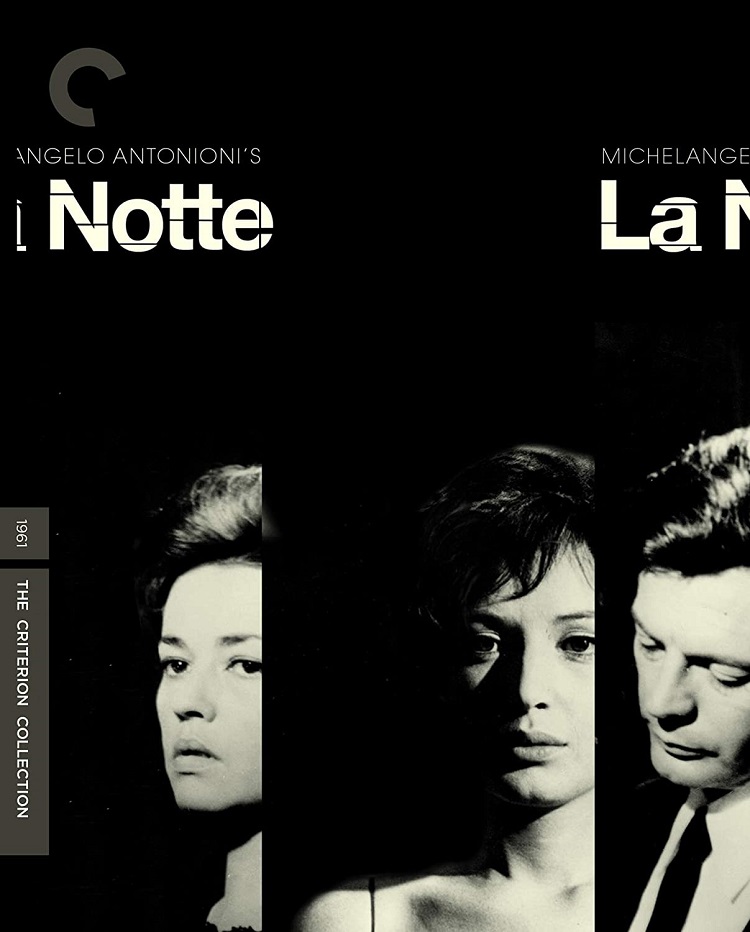
La Notte is definitely a film from a different era where plots were not entirely clear until the third act, stories were primarily driven by dialogue and characterization, and the one-line pitch/synopsis of the movie makes it sound positively dull. It examines people and relationships and raw humanity, without special effects or hyperbole — just unsettling honesty. This is a cerebral kind of film on which viewer opinions tend to be very divided between being touching and engaging or outright boring.
I also realized while watching this Italian-dialogue English-subtitled story that most of the movies I watch with subtitles are more action-oriented flicks where story is secondary to the mostly unspoken climactic battle sequences. La Notte demands your full and unfettered attention throughout, and over the course of a slow build up with some fairly minute details along the way, it all starts to come together.
The story surrounds a day in the life of a couple living in Milan, Italy, a married pair where the wife Lidia (Jeanne Moreau) has fallen out of love with her husband and her husband Giovanni (Marcello Mastroianni) has been too caught up in his writing projects to notice. Lidia tends to direct her husband toward available and interested women — like the enchanting heiress Valentina (Monica Vitti) — without displaying a hint of jealousy. She seems to want him to be happy, particularly with anyone but her, but without leaving their marriage. At the same time, Lidia struck me as kind of a stick in the mud, a wet blanket in all but a few moments over the course of the two-plus-hour film. She goes to parties to escape their otherwise stagnant home life but doesn’t really engage in the social scene or have any fun, she attends her husband’s book signings but looks for the first exit to go wander around and potentially get into trouble, things of that sort.
When approached by an interested young man, Lidia seems to want to play along, but ultimately shoots him down. Meanwhile, Giovanni is doing his best to make something happen with Valentina despite her repeated attempts to dissuade him. These sorts of complicated interactions aren’t uncommon in day-to-day life, any more now than they were 52 years ago when the film debuted. La Notte has been compared to films like Lost in Translation and Eyes Wide Shut in terms of examining relationships in an approachable and captivating way for the viewer, but also leaving more questions than answers when the credits roll. For some, this is lack of resolution is unsettling and unsatisfying, as the conflict is not neatly wrapped up with a bow on it by the end. However, this is how things often go in real life, and some will really latch onto a believable story like this.
Personally, I didn’t particularly enjoy watching it at the time, but as I reflect upon it in writing this review, I’ve developed more of an appreciation for what it was doing, in its time or any time. Films like this don’t come around every day, and writer/director Michelangelo Antonioni certainly laid solid groundwork for similar films to build upon and draw inspiration from.
The Criterion Collection extras on the disc include the original 1961 theatrical trailer for the film, a 2012 interview with film critic Adriano Apra and film historian Carlo di Carlo who discuss the director’s body of work and this film’s visual style, and a 2012 interview with Harvard Visual and Environmental Studies professor Giuliana Bruno examining the narrative role of architecture in the movie. Subtitles are only available in English and there is no option for an alternate language dubbed audio track.
It’s probably a no-brainer for fans of classic film and Italian cinema to pick this up. For everyone else, it’s going to depend greatly on your attention span and interest in examining human interaction and how we sustain our relationships with one another. I tend to appreciate these kinds of stories, but even I found the plot development to be a little on the slow side here. Looking back, though, I’m glad I can say I’ve seen it.